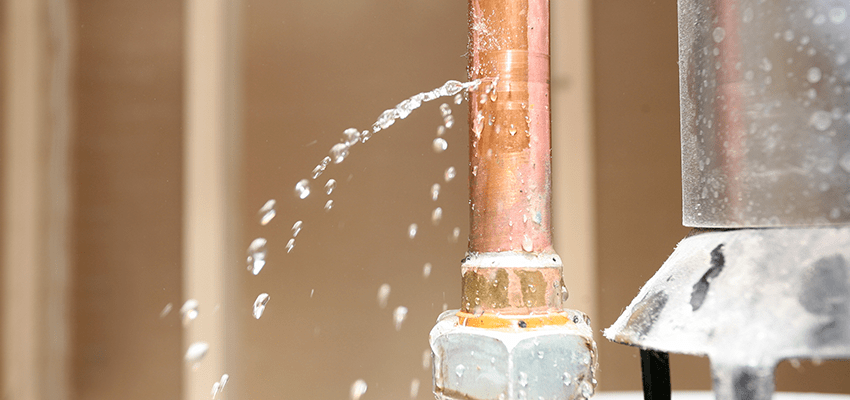PLUMBING SERVICES
Repiping Your Home
Do you have Gray Polybutylene Pipes?
If your home has polybutylene piping installed, it's a matter of when, not if, your polybutylene piping will leak, potentially causing significant water damage to your home.
What are polybutylene pipes, and why are they a problem?
Polybutylene pipes were a low-cost, easy-to-install alternative, leading them to be the most popular substitute for traditional copper piping from 1978 to 1995.
Over several years, a combination of oxidation and chlorine in the water supply causes poly b pipes to swell and crack, causing them to leak and damage homes.
If you have poly b pipes, don't panic, give us a call (703) 670-8519 for an estimate. There is less plumbing in your house than you think.
What is Repiping?
In many older homes, pipes made of galvanized steel or another material that may one day begin corroding. This is much more likely in homes with small (even undetected) slab leaks. The corrosion may not be immediately obvious since the visible portions of the pipe look good. However, this is the part that doesn’t touch the water. The inside of the pipes become clogged with rust and the water pressure may begin slowing. In addition, the corrosion makes it easier for pipes to break or small leaks may occur that cause damage to your home from the inside out.

Repiping means that the old, rusty, damaged pipes are taken out. Then, new pipes are installed that improve water pressure and assure that the water entering your home is as fresh and clean as possible.
How Do You Know it's Time to Repipe Your Home?
Some of the most common signs that your home needs repiping include:
- Low water pressure
- Difficulty running water in more than one area at a time
- Slab leaks
- Red or discolored water
- Water with an odor
- You have gray polybutylene pipes
Repiping a home can be a big job, so it is best to work with an experienced professional. If you are in Fairfax or anywhere in the Northern Virginia region, contact us at Nichols & Phipps. We will work with you through all steps of this process.
Plumbing Pipe Types
PEX Pipes
PEX, or cross-linked polyethylene, is a modern choice for indoor piping. The pipes have become quite popular because they are flexible, durable and are some of the fastest to install in most homes. PEX is a solid, flexible material that is resistant to freezing and corrosion. Plus, the pipes do not cause much heat loss, getting hot water to you quickly!
Copper Pipes
Copper pipes are a good choice for many homeowners because of the durability aspect. In most cases, these pipes have a lifespan of around 50 years. Copper naturally resists bacterial growth, keeping your water supply clean and safe. With the installation of these pipes, you will usually see an improvement in water pressure too.
PVC Pipes
PVC is a highly durable plastic/vinyl material. Since the pipes are not metal, they resist corrosion and do not rot over time. The durability of these pipes mean they can withstand bending and movement.
CPVC Pipes
Another plastic type pipe is the CPVC pipe. This plastic material also has strength and flexibility. You’ll most often see these pipes used for lines transporting hot water because CPVC has extreme resistance to heat. In addition, they are also corrosion-resistant. Because these pipes cannot be exposed to sunlight, they must be used indoors or deep underground.
How Much Does it Cost to Repipe a Home in Northern Virginia?
If you have found that low water pressure or discolored water is a significant problem in your home, it may be time to replace your pipes. Or, on the other hand, if you are doing extensive remodeling or renovating you may have realized that replacing your pipes now would be more economical than waiting until the situation is urgent.
One of your biggest concerns about replacing pipes is likely the cost. Determining the cost is tricky and a bit intimidating.
First and foremost, work with a professional. The team at Nichols & Phipps would love to work with you on your project, but even if you do not choose us, make sure you research the chosen plumber and choose a firm with a good track record. Once you begin working with the plumber of your choice, several factors will determine the project's final cost.
- Home Size - The size of the home is a major factor in the cost. After all, with a larger home, more piping will need to be installed. A home with more bathrooms, appliances, or additional features such as a pool will raise replacement costs.
- Complexity of layout - It is easier to use the path of your existing plumbing, but sometimes that is just not possible. Sometimes a smoother route needs to be explored for future ease.
- The height of Home - It will cost more to replace piping in a multi-story unit than a ranch-style home. The higher the plumber must work, the more labor is required to get the piping up to these levels.
- Materials - We reviewed some of the different material options above. Each has a different price. Your choice of material will affect the final cost of the project.
- Demolition - When you replace existing pipes, some demolition is required. Depending on the condition of the pipes and what type they were, the costs to demolish can vary.
There is a lot to think about when repiping your home. If you would like to learn more about the process or get an estimate on your project's costs, contact us at Nichols & Phipps today by phone at (703)-670-8519. We will be happy to help you get started!
-
Call: (703) 670-8519
View Special Offers & Coupons
Why Nichols & Phipps for Plumbing?
- No Sneaky Upgrades or Dishonest Tactics
- 24-Hour Emergency Service
- Repiping Services
- Bathroom Remodels
- Financing Available with Approved Credit
- Accurate Proposals
